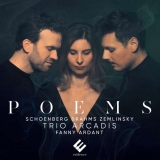 Poems; Arnold Schönberg: Verklärte Nacht; Johannes Brahms: So lass uns wandern; Alexander Zemlinsky: Trio in d-Moll; Johannes Brahms: Die Nonne und der Ritter; Trio Arcadis, Fanny Ardant, Sprecherin; 1 CD Evidence EVCD073: Aufnahme 06-11.2020, Veröffentlichung 28.05.2021 (72’00) - Rezension von Guy Engels
Poems; Arnold Schönberg: Verklärte Nacht; Johannes Brahms: So lass uns wandern; Alexander Zemlinsky: Trio in d-Moll; Johannes Brahms: Die Nonne und der Ritter; Trio Arcadis, Fanny Ardant, Sprecherin; 1 CD Evidence EVCD073: Aufnahme 06-11.2020, Veröffentlichung 28.05.2021 (72’00) - Rezension von Guy Engels
Verträumt, mysteriös, hin und her gerissen zwischen Hoffnung und Enttäuschung – so spielt das Trio Arcadis das Andante aus Zemlinskys d-Moll-Trio. Sämtliche romantische Bilder der Nacht werden suggeriert: die Nacht als Ende des Tages, des Lebens aber ebenso als Anfang von Neuem.
Besonders zu Beginn des 20. Jahrhunderts, eine Zeit der kolossalen geopolitischen und sozialen Verwerfungen, spielen Nachtgedanken, das Verschwinden, der Untergang eine große Rolle in Literatur und Musik.
Das Trio Arcadis bringt dieses Stimmungsgemisch glänzend auf den Punkt – mit der nötigen Expressivität aber ebenso mit lyrischer Zurückhaltung und Intimität – vor allem im Trio von Alexander von Zemlinsky und in Verklärte Nacht vom Zemlinsky-Schüler Arnold Schönberg.
Die hochromantische Musik von Johannes Brahms, der mit zwei Lied-Adaptationen vertreten ist, passt perfekt in dieses Programm.
“Falsche Nacht, verwirrst die Sinne/Welt Ade! Gott woll’ bewahren/Die noch irr im Dunkeln fahren.” – heißt es im Lied ‚Die Nonne und der Richter‘ auf ein Gedicht von Joseph von Eichendorff.
Wie Wort und Musik sich ergänzen, wie das eine das andere ergibt, unterstreicht die Schauspielerin Fanny Ardant, die die jeweiligen Gedichte rezitiert – wenn auch in französischer Übersetzung. Nachdenklich, ruhig in Ton und Rhythmus gibt sie die Stimmungen, die die Musik anschließend aufgreift, wieder.
Dreamy, mysterious, torn between hope and disappointment – this is how the Trio Arcadis plays the Andante from Zemlinsky’s D minor Trio. All romantic images of the night are suggested: the night as the end of the day, of life, but equally as the beginning of something new.
Especially at the beginning of the 20th century, a time of colossal geopolitical and social upheavals, night thoughts and disappearance play a major role in literature and music.
The Trio Arcadis brings this mixture of moods brilliantly to the point – with the necessary expressivity but equally with lyrical restraint and intimacy – especially in the Trio by Alexander von Zemlinsky and in Verklärte Nacht by Zemlinsky’s student Arnold Schoenberg.
The highly romantic music of Johannes Brahms, who is represented with two song adaptations, fits perfectly into this program.
« Falsche Nacht, verwirrst die Sinne/Welt Ade! Gott woll’ bewahren/Die noch irr im Dunkeln fahren. » – it says in the song ‘Die Nonne und der Richter’ on a poem by Joseph von Eichendorff.
How words and music complement each other, how one results in the other, is underlined by the actress Fanny Ardant, who recites the respective poems – albeit in French translation. Thoughtful, calm in tone and rhythm, she reproduces the moods that the music subsequently takes up.






















